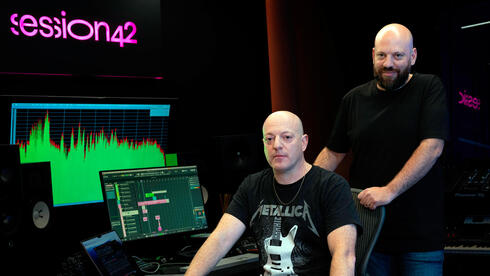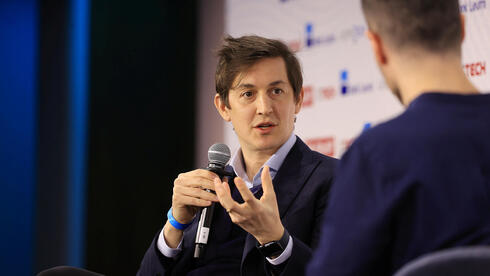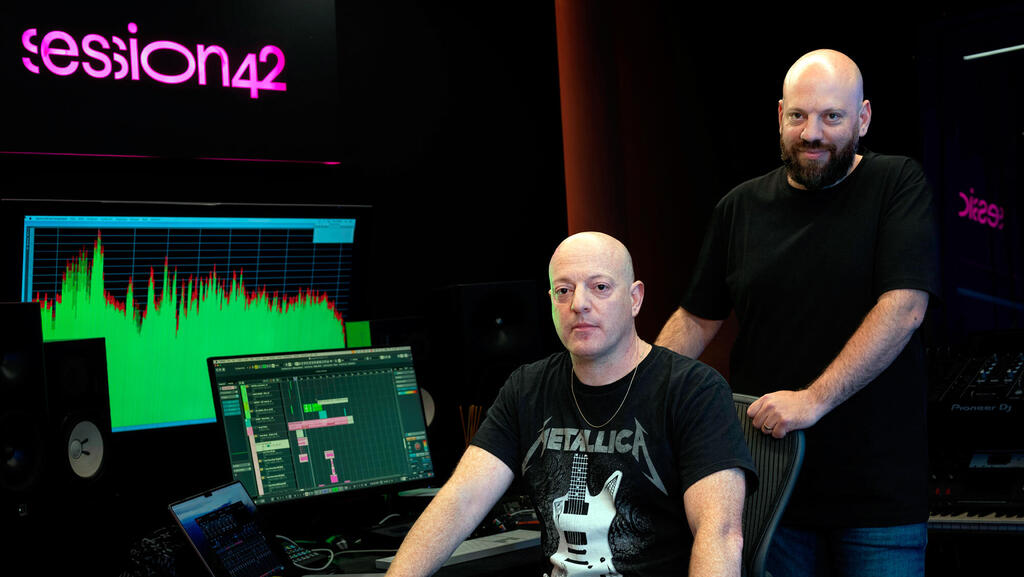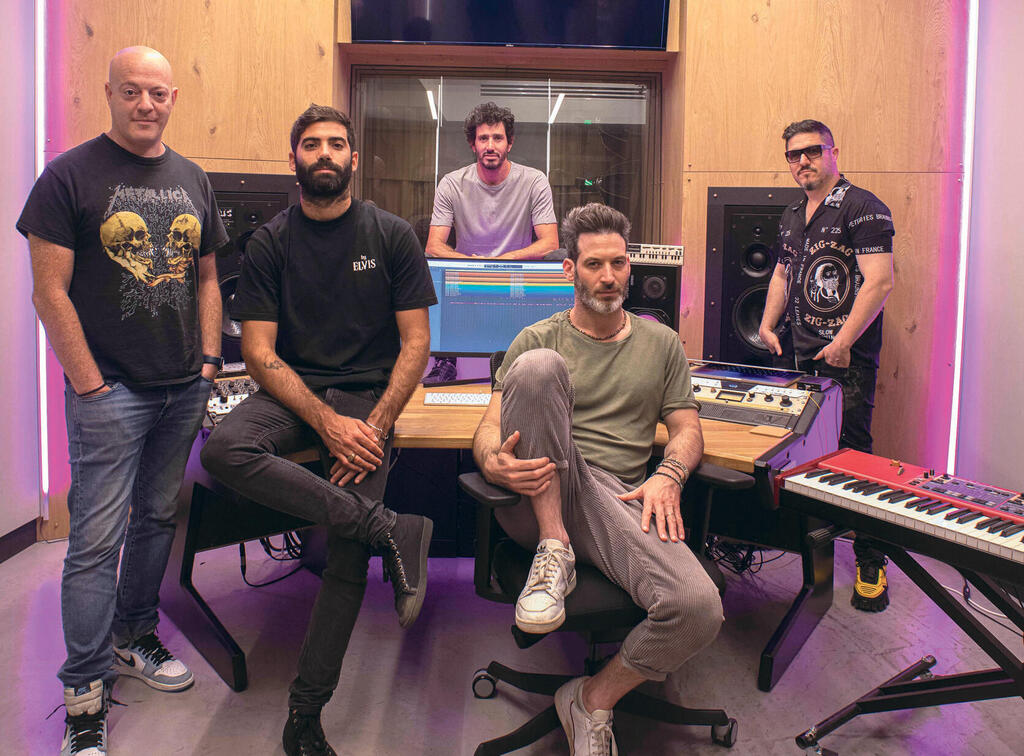
Music to their ears: Pop hit-producing brothers harness the power of AI
After two big exits with high-tech companies, and after producing some of the biggest music hits of the last few years in Israel, the Antebi brothers are ready to connect the two worlds, and make musical technology, or technological music, with AI tools that should make each of us a music producer.
Oudi Antebi’s company is involved in the production of the songs that have shaped Israeli music in recent years: from Netta Barzilai's Eurovision-winning song "Toy" through Noa Kirel's "Unicorn". From Lior Narkis and Omer Adam's "Revolution of Joy" to "Hurricane" by this year’s Eurovision representative Eden Golan. In total, Antebi has over 160 hits on his resume, but when he's looking for an example of really good music to explain what his company does, he goes back as far as Simon and Garfunkel.
"Each year, 1.5-2 billion songs are created, according to estimates," Antebi explains. "This includes what a child with a guitar improvises at home, and also the biggest hits. About 40 million songs are streamed a year. This probably means that the best song in the world has not seen the light of day, that the next 'Sound of Silence' exists on some iPhone of someone who didn't do anything with it. So there's still A&R (artists and repertoire), a person whose job it is to find talent, but it's very inefficient. The whole industry is inefficient, and things work on serendipity." His brother and partner Roy is quick to provide an example: "Justin Bieber would not have been discovered if Dr. Dre had not encountered him on YouTube. It's insane."
And that's where their startup comes in. "For example, I have written three songs in my life, but no one has heard them, because I am embarrassed," says Oudi. "So in what kind of world do we live in, that even at gunpoint I would not be ready to reveal these songs, I would go to a producer and tell him 'make me a song',?"
So you "make songs"?
Roy: "Imagine, let's say, Ron B sitting in the living room and writing a song" - Ron B is one of the leading hit writers in Israel, who was involved in the creation of hits like Omer Adam’s "Madhouse" (Beit Meshugaim). "He may be humming in his head, he has a melody with two sentences, he opens the iPhone, records, and closes it. People like him do this a lot, there may be a situation where Ron B has 40 of these on his iPhone in a month. But he cannot play such a recording to Noa Kirel from his iPhone for her to take the song. He needs what he has in his head to sound like music to another person as well. So he needs to take all the beginnings of the songs, say 'these are the best ten', go to the producer and do for all these a professional sketch, and along the way he throws away 30 other songs. But our tool allows him to easily take all 40 of his ideas and turn them into something that can be played to the artists, so that they don't get lost just because of the process and money."
And how is it supposed to overcome the coincidences and make songs stand out from the flood of the current era?
Oudi: "We won't be able to completely eliminate the fact that certain songs won't stand out, it's a bit pretentious, but in the next stage of the product, it will offer connections between creators and performers based on artificial intelligence. And in the end, good content wins. Finding a good song is like finding a needle in a haystack. Performing artists who don't write songs look for 'wow' songs everywhere, because a 'wow' song builds a career, and on the other hand, non-wow songs end careers."
The Antebi brothers call their tool HitCraft, and aim right at a workshop for hits. This is an artificial intelligence tool for music production, which they developed in their music company, which became a music-tech company, Session42. HitCraft is intended for professionals but also for anyone who wants to turn an idea into a professional sketch, using the computer or even the smartphone. "We're not just an artificial intelligence model," Oudi explains. "You don't just train a model using songs, you don't just teach it 'this is a D chord, with distortion or without, on a guitar or on a piano' and tell it 'make me a D piano'. This is already happening in the world of generative artificial intelligence. We are creating a more complex algorithm , including an analysis of the song and the creation of a very accurate skeleton, on which all the instruments and roles can be dressed. That is, our model is the entire production, with sound in several channels, even dozens of channels. If we could do it without artificial intelligence, we would do it. But it allows countless interactions with the songs, no two will be the same, this is important to us."
And how will it bring in money?
"The business model will be a monthly subscription that will allow you to produce a certain number of songs. In the future we may work more broadly, for example including royalties. If until now we have made songs with artists who are already active, now everyone can make songs with us. We will have a million, not 160."
There are already those who criticize the music industry of the last few years, in Israel and around the world, claiming that these are engineered hits, a duplication of formulas. If you put artificial intelligence in there, which in advance is based on existing hits, don't you increase the number of formulas? You start from an example of a "small" but beautiful and original Simon and Garfunkel song, but promise a technological tool that may increase the reproduction of precisely the opposite, soulless pieces.
"We deal with this a lot in the company, because one of the problems of artificial intelligence is that it only knows how to work on what has already been done. We feed the latest things into the system, with the help of humans, and as soon as a new subgenre is born, we promote it, because if you release a song, you want it to be contemporary. And as mentioned, people are involved in the process all the time, and this is what allows us not to avoid duplicity. We have producers, musicians, and we build it in their image, and this is the added value in the connection between the tech people and the musicians."
Music is money: How Metallica made me $5 million
Session42 is the fourth joint company of Oudi (49) and Roy (45) Antebi, but it is the first in which they dive into their common love, music. Not only as listeners: Oudi is a guitarist, Roy has been a drummer since his youth in the band Ola Mystic. The music was waiting there the whole time until they started to realize that they had to do something with it. In their previous startup, Redkix, it even provided them with quite a bit of money, and quite by chance. That's how it is in the world, coincidence is important, even if it is treated as a problem that needs to be solved.
Redkix, founded in 2014, developed an application to expand corporate email services. The Antebis then received an investment of $8 million from Salesforce, the American software giant, and Oudi asked to meet with the CEO of the investing company, Marc Benioff. "At Salesforce, they asked me with a laugh: ‘Why do you want to meet with him?'" he recalled. "I answered: 'He invests in me, doesn't he deserve to meet me?'. They told me: 'We have 230 portfolio companies,' so I answered: 'But there is only one Oudi.'"
In the end it worked, and in May 2016 Antebi came to a meeting with Benioff. "They prepared me for the meeting, his business manager rehearsed the slides with me, he arranged every letter for me. But there was a half hour delay, I realized that I had to skip half of the slides, I had no idea what I was going to say, and then they put us in the meeting room, Marc arrives, and the first thing he says to me is 'what's up with the shirt?'" Antebi simply arrived at a meeting with one of the world's leading technologists wearing a Metallica t-shirt. It had nothing to do with Benioff; Antebi always wears Metallica t-shirts. Every day, everywhere. On festive occasions he simply puts a jacket over it. He collected his shirts, among other things, from 47 live performances of the band that he has seen so far.
When the well-known investor commented on the t-shirt, Antebi did not see it as an insult. "I told him that I love Metallica, that even on my LinkedIn it says Chief Metallica Officer. Then Marc sat down, opened LinkedIn on his iPhone and asked how to spell my name. I started to explain what the company does, he interrupted me again and again, I got annoyed and told him: 'Marc, you're not getting it'. Then I look around, see everyone's reactions and almost have a heart attack. But then he says to his people: 'I have no idea what this company does, but I like this guy', and turns and says to me: 'Do you want another $5 million?'"
Just before the end of the meeting, Benioff surprised him even more. He made a video call to Metallica's drummer, Lars Ulrich. "He told him, 'Hey man, I met a cool guy,' and put the phone in front of my face. And what do I say to him? 'Is that really you?'" Anatebi laughs. He couldn't believe it was happening to him. He has admired Ulrich and his friends since the age of 16, "and apart from standing outside their house and stalking them, because it would be too much, I did everything to reach them. The closest I got was to the guy who sells them microphones, and I already gave up."
Then Benioff came, and called Ulrich, who invited Antebi to his house. "And when I visited him, it was the only day I didn't wear a Metallica shirt, I didn't want to look too enthusiastic." The drummer and his Metallica friends invested $3.5 million in Redkix, and Ulrich hosted Antebi backstage at the band's shows and increased his stock of t-shirts. Suddenly the connection between music and money seems more logical than ever.
No trash music: This is how we build the next Ariana Grande
In 2018, the Antebis sold Redkix to Facebook for $105 million. This was already their second exit, after selling OffiSync, which connected Microsoft's Office applications to Google's applications, for close to $30 million in 2011. In short, they had enough money to start diving into the world of music. Roy, the technology guy, actually lived in London and worked at Facebook, which bought Redkix. Oudi, the manager, returned to Israel from California. In the last two years there he mainly played music. This is what life looks like after the exit. He learned guitar and practiced and studied and practiced and then returned to Israel, because his daughter decided to enlist, advised start-ups and studied music production at the Rimon school.
With the growing interest in music production, Abtebi came to do an unofficial internship with Tal Forer, one of the busiest music producers in Israel. He stayed with him for five months, studying production - but even more than that he studied the industry. Antebi simply asked everything all the time from everyone who came to the studio. "I simply introduced myself as a friend of Forer and asked, 'What do you do? How much do you earn? Where does the money come from?'. Suddenly popular Israeli musician Ran Danker arrives and I don't know who he is. I haven't lived in Israel for 18 years, so I ask: 'What do you do?', exactly like that. It was very embarrassing, but these questions removed all the masks: I don't know who you are, so you don’t have to be fake with me. And people talked to me, opened up, told me, and I gathered information from something like 300 people." He discovered, for example, that everyone thinks that someone else is profiting at their expense: "If you're a creator then you hate AKUM, if you're a label then you hate the (Israeli Record) Federation." Everyone does their job, it's just that in Israel everyone thinks they're being screwed over, it's so ingrained in the culture."
With these insights, in the summer of 2021 Oudi Antebi founded Session42 with Forer, Stav Beger, Yinon Yahel, also among the leading producers in Israel, and Amit Shine. The idea was to build a house for music production, which provides the producers and studios with marketing tools, does not charge the artists a fee - but receives a percentage of the royalties, basically entering as a partner in the song. It's an interesting model that Antebi actually brought from the world of technology to the world of music, and under which the group produced more than 160 songs, including huge hits and the AI duet between Ofra Haza and Zohar Argov. How well has the business model proven itself? Oudi talks about a "royalty catalog of hundreds of thousands of dollars". On the other hand, some key people in the industry estimate that the model was actually not profitable.
And besides, says Antebi, "there is also Eden": Session 42 is the agency that represents Eden Golan, Israel's representative for the last Eurovision and from now on also a presenter for Fox with a contract of about NIS 700,000. "A year and a half ago Yinon Yahel sent us a video of her on Instagram singing and dancing, and we all recognized her star quality. The next day she arrived here with her parents and we signed her up. She is going to be a superstar in the world, the next Ariana Grande. We already have partners in the United States, we have built a whole strategy. Eden is very special, I don't think there has ever been such a talent in Israel."
And besides all these, "our most interesting income is the one that hasn't arrived yet", he says, referring to the new production tool. They are currently focusing only on the development of the HitCraft, which is in its early stages. For that matter, Oudi recruited Roy, who had returned from four years in London ("We wanted our kids to grow up here"), as Chief Technology Officer (CTO). No more song productions, no artists, no more clubs. "We are focused on the production of artificial intelligence systems, if you have other things going on it simply takes up your time as CEO," explains Oudi. "This does not mean that we will not do something for the soul every now and then, but it is on the margins, and Eden is managed separately, given attention as an independent unit, like a subsidiary."
3 View gallery


Israel's Eden Golan performs at 2024 Eurovision
(Photo: Martin Sylvest Andersen/Getty Images)
How does a devout Metallica fan get to the point where they're excited about creating the next Ariana Grande? Like quite a few other things in the history of Israeli music, the answer is - thanks to Yair Nitzani. "I got into music as a business. I was exposed to this matter of royalties and money and it blew my mind, and then I realized that in order to make money you have to make pop music," says Antebi. "I remember at the beginning of Session 42, musician/songwriter Yair Nitzani came to visit me. He said, 'What an amazing thing you're doing here,' and I said: 'It's just a shame we're making trash music.' He looked at me, and said, “I have two things to say to you, 1. There’s no such thing as trash music. 2. It's a shame you don't enjoy the music you produce. And it really shook me. As a metalhead who was hooked at 16, not listening to pop music was like a religion, it has nothing to do with anything - if you heard pop you’d turn it off. If Madonna comes on the radio, you turn it off, you only listen secretly. But the day after the conversation with Yair, I arrived at the studio and said to myself: 'Stop rejecting pop music like the body rejects transplanted organs, just enjoy it.' Since then it's been fun for me, and there are great songs."
Music is joy: When two exits don't make you happy
Oudi, who lives in Tel Aviv, is the extrovert, the pusher, the manager. Roy, who lives in Ganei Tikva and is now being interviewed for the first time, is an introvert. Oudi brings the vision, Roy translates it. That's how they are. "At OffiSync, their first startup, Oudi would call me after meetings and say: 'I told them we have this and that feature and we don't have it, so now we have to do it,'" Roy says. "And I know how to wait and organize what he tells me. Oudi can't pressure me."
Their father, born in Aleppo, fled Syria alone at the age of 16. "He stole money and fled here with a friend," says Oudi, "and here he studied, went to the army - and then was recruited to the Mossad by his uncle who worked there." Oudi was born in Israel, but when he was 3 years old, the family began to migrate to Europe, where Roy and the younger sister Liat Abelson, also a high-tech person, were born. "Until I was 16, I didn't know what my father did, he told us he was a clerk at the embassy," says Roy. "In general, until two months ago he didn’t tell us anything." Since then, it turns out, the father started talking and telling. "Until recently, it was forbidden to even say the word Mossad. He called it 'the office', and now suddenly we are sitting at dinners and he throws out stories," explains Oudi.
And what did your childhood look like in the shadow of a father working in the "office"?
"My father was not at home at all, he would leave on Monday morning and return on Friday, but strangely, I have no memories without him. We studied at a Jewish school in Brussels, we went there by shuttle, a bus with a police car in front of and a car behind. When the bus arrived at our house it would block the entire entrance, stop, policemen with long guns would get out of the car, the door of the bus would open, a Shin Bet man would get off, and only then could you get on the bus. In real time you don't even think about it, it seems normal to you. Until recently I didn't even stop to think about how crazy this was. It's like a prison - you enter a school and there are Shin Bet people on the roof. When we were in high school, we had an agreement with the Shin Bet that if we cut school, we would come and tell them, and the wives of the Shin Bet were our teachers. We received training on how to check that there are no bombs under the car. You don't think about it being a bomb, you just check if there is something under the car."
This life, he says, brought the brothers closer. "We did everything together, Roy was my best friend, and we were at home a lot. I was very immature, he is four years younger than me, but I went down to his level instead of him going up to mine."
Roy: "It's also Belgium, so it's cold, closed, gray, school until 5:00 p.m. We didn’t go to friends' homes because it was far. It was intense. I tell people that we've only been in a physical fight once in our lives and they don't believe me."
The family returned to Israel in the nineties, and in 1996 the brothers founded their first startup, the dating site Multidate. "Oudi was standing by the stairs in my parents' house and said to me: 'You know how to program, so let's make a product that sends people a form, they mark what they are looking for in a partner, and the software scans the form, uploads it to the computer, and matches them,'" Roy recounts the moment the company was born. "The first ten forms we received were from men," says Oudi. "Who will you match them with? My girlfriend at the time—later my wife and now my ex-wife—sat on the floor in the hallway, spread out the forms in front of her and said, 'Oh, he's so cute, maybe he'll match my girlfriend Stav?'. And out of the first ten matches there ended up being three weddings."
The service gained momentum and went online but did not generate profit, barely avoiding loss. "One day we just turned off the computer," says Oudi. "If we knew that breaking even in the world of startups is amazing and that there is such a thing as raising money... but we knew nothing. It was an experience, we learned a lot, and suddenly we had a business, without intending to." Then they joined other people's companies, then came Offisync and Redkix, and now the new adventure that looks completely different. The main insight from the previous exits was that they will not find happiness in the bank account, they have to look for it elsewhere.
"At the first exit, the money goes into the bank and you say 'Holy shit,'" says Oudi. "But two days later I was driving in the car, I put on Metallica, and I realized that I wasn't happy. Our goal was not to change the world but to make money, and I said to myself: 'I did it, I should be happy'. The same thing happened with the relocation, after a few months you understand that you are depressed." Roy adds: "I imagined that when the money came in I would be happy, 'Wow, what fun'. But it's not like that." "And now," says Oudi, "it's fun that the hobby is also the business. There's nothing like the energy you get from working on something you love the most, that is something that can’t be bought."
















